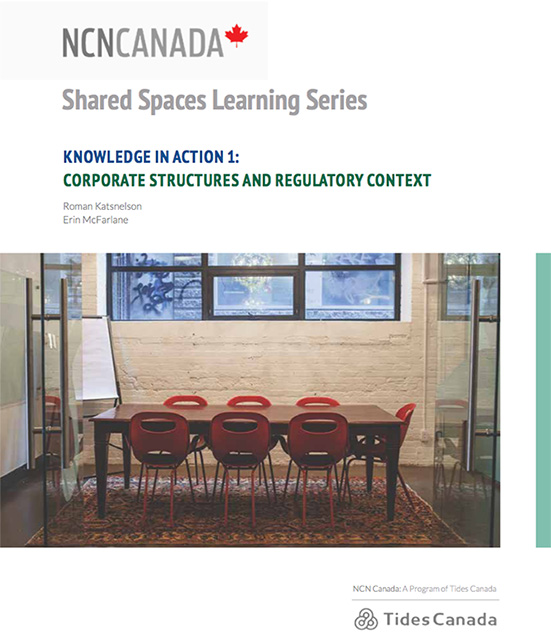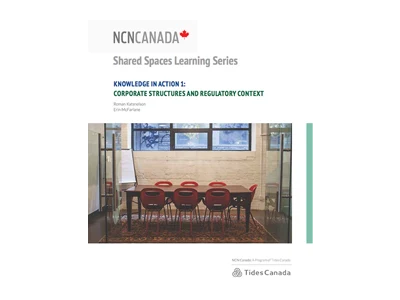Mission-driven shared spaces have long operated across Canada in service of a variety of social and hybrid missions.
The phenomenon of shared spaces has been experiencing a surge in growth and strategic interest across the public, private and non-profit sectors. In 2015, The Nonprofit Centers Network (NCN) and the Social Purpose Real Estate Collaborative (SPRE) hosted a series of conversations and research project about the unique needs of Canadian organizations involved in non-profit and mission-based shared space projects. In 2016 Tides Canada, with support from NCN, initiated a new program, NCN Canada, to begin to address these needs.This paper is part of NCN Canada’s Shared Spaces Learning Series initiative, designed to contribute to the emerging national conversation about the roles, capacities and limitations of shared spaces, understood in various contexts as Community Hubs, Social Purpose Real Estate and Non-profit Centres.
The Shared Spaces Learning Series features “Knowledge in Action” research briefs, which gather and summarize relevant data and information and case studies, highlighting emerging practices and perspectives in Canadian shared spaces.
What is Inside?
Part 1: Knowledge in Action 1
Corporate Structures and Regulatory Context
This research brief is organized in three sections: Preliminary Considerations, Corporate Structure Options, and Considerations for Registered Charities. Sources and additional resources can be found throughout the research brief.
Part 2: Knowledge in Action 2
From Start-Up to Sustainability – Emerging Business Models
Canadian non-profit centres, as one manifestation of social-purpose real estate, are firmly situated in the social economy. While the mix of legal structures varies greatly (from non-profit societies to public foundations to corporations limited by guarantee), non-profit centres exist in service of social missions “searching for a space – distinct from both the state and the market – that offers focal points for constructive forms of civic engagement.” In support of their missions, centres operate at the intersection of the private, public and non-profit sectors. Strategic financial acumen – the development, clarification, evaluation and adaptation of your centre’s business model – is one capacity critical to the success of your space and your mission.
This paper is organized in three sections: Building the Puzzle, Sustaining the Function, and Centre Profiles.
Part 3: Knowledge in Action 3
Proving and Improving – Evaluation in Shared Spaces
As social enterprises, shared spaces operate in a context of complexity, exhibiting great variation in legal structures, business models, and operational mandates. Across this wide diversity, however, common themes exist. Shared spaces are mission driven to support their members, strengthen their organizational and collaborative capacity, and support system change in the sectors in which they operate. In other words, in accordance with your particular vision and mission, your centre seeks to make a difference – and that work engenders some necessary questions.
- How do you know what difference is actually being accomplished?
- How well do you understand any links between your model, your work, and the impacts they create?
- How accurate are your assumptions about what your members need from you?
- How do you use what you know to effectively communicate with others?
This paper is organized in three sections: Proving: Evaluation for External Stakeholders, Improving: Evaluation for Internal Stakeholders, and Canadian Resources.
Complete the form and get
free instant access!


